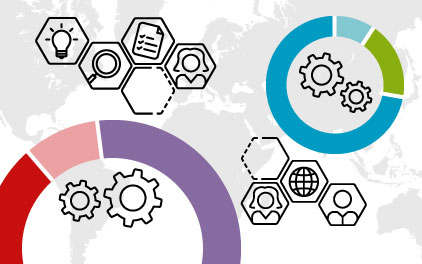

- RURAL DEVELOPMENT
- SUSTAINABLE INFRASTRUCTURE
- SECURITY, RECONSTRUCTION AND PEACE
- GOVERNANCE AND DEMOCRACY
- SOCIAL DEVELOPMENT
Bolivia
GIZ local staff
National employees: 133
International employees: 7
Development workers: 12
Integrated experts: 1
(as at: 31.12.2023)
The Deutsche Gesellschaft für Internationale Zusammenarbeit (GIZ) GmbH has been working in Bolivia since 1962 and opened an office in the capital La Paz in 1995. GIZ’s main commissioning party in Bolivia is the German Federal Ministry for Economic Cooperation and Development (BMZ).
In global terms, Bolivia is an emerging economy with middle per capita average income. However, it remains one of South America’s least prosperous countries. Challenges facing Bolivia include a lack of basic public services, climate change and limited industrial development.
There is still a considerable gap between urban and rural areas in terms of access to drinking water and appropriate sanitation systems. A key goal of the Bolivian Government is therefore to ensure that the entire population is supplied with drinking water and sanitation by 2025.
Around 15 per cent of the population still has no access to electricity. The Government therefore aims to make Bolivia a positive example of energy efficiency in South America – by increasing the share of energy from renewable resources, for example. Bolivia is also particularly vulnerable to the impacts of climate change. Droughts, flooding and water scarcity affect the agricultural sector and jeopardise food security.
Cooperation between Bolivia and Germany currently focuses on the following priority areas:
- Drinking water supply and sanitation
- Rural development and the environment
- Energy
GIZ’s main commissioning party in Bolivia is the German Federal Ministry for Economic Cooperation and Development (BMZ).
For drinking water and sanitation, an extensive range of advisory services and training have been put in place across the country in collaboration with national authorities, companies and other service providers. These services are provided to water utilities to help promote their institutional sustainability. As a result, more than two million Bolivians have benefitted from improved access to drinking water and sanitation. Other topics include the efficient use of drinking water and the promotion of vocational training in the water sector.
To improve rural development and the environment and enhance sustainability, GIZ is also helping to increase smallholders’ yields through resource-saving irrigation systems. This has improved the living conditions of more than 200,000 people in rural areas. To make Bolivia more resilient to the impacts of climate change, GIZ is working to preserve water sources and other natural resources in water catchment areas. In the Chiquitania region, for example, an area the size of more than 5,200 football pitches is to be managed sustainably in the coming years.
GIZ is also promoting energy efficiency in the country. Over the past ten years, one in ten people in Bolivia has gained access to modern, efficient energy sources thanks to support from GIZ.
Further areas of GIZ’s work in Bolivia include the promotion of cooperation with the private sector, the promotion of dual vocational training, conflict transformation and gender equality.



